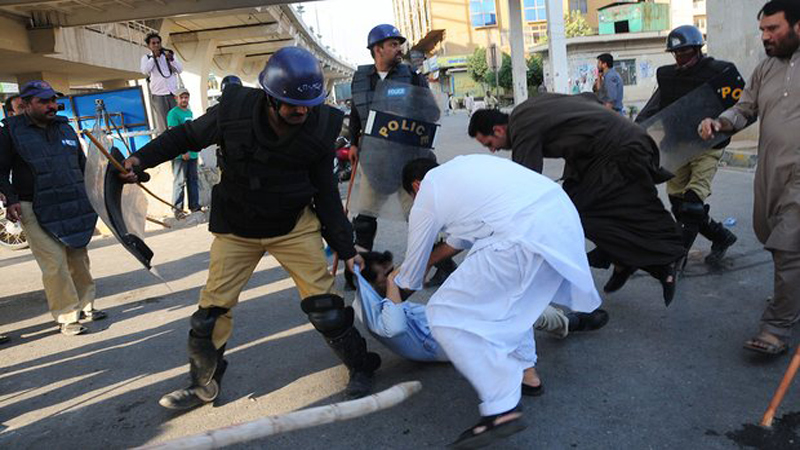LAHORE: Punjab police launched a massive crackdown on the Pakistan Tehreek-i-Insaf (PTI), Pakistan Awami Tehreek (PAT) and PML-Quaid workers in different districts of the province.
To bar the protesters from reaching Islamabad, most of the bridges on rivers, including Chenab, Sutlej and Indus, connecting different cities have been blocked for traffic by placing containers. (Source: Dawn, 31/10/2016).
Comment:
As PTI lead the way to account Prime Minister Nawaz Sharif and his family demanding an enquiry into revelations of financial dealings in the Panama Papers leak many other parties are joining in. A complete lockdown of Islamabad is planned by PTI on November 2nd 2016; Jamat Islami has had sit ins in Lahore and planned for Gujranwala; Awami Muslim League’s Sheikh Rasheed has shown antic filled protests in Rawalpindi in the last week of October; PPP’s Bilalwal Bhutto has voiced his support by citing the call of JI for complete accountability. Also Awami Thereek (Dr Tahir ul Qadri) is back on the scene after the last PTI-PAT joint sit in 2014 along with Lal Masjid supporters also adding weigh in on this anti-government drive.
The common denominator is to get rid of the current corrupt ruling elite symbolized by Nawaz Sharif and his family. For this goal, those that are at other times poles apart are ready to unite. This is interest based politics which is the way of the current capitalist system. Alliances of the oddest kind can be made in the search for the greater good.
Although corruption is endemic to the political system in Pakistan and permeates through society at all levels the solution will never come through sit-ins and protests that focus on one incident or even many at one time. The Parties are asking the current democratic systems mechanisms to bring Nawaz Sharif to account, a judicial enquiry, resignation, early elections-everything is being proposed. No one is asking the simple question as to why individuals in positions of power can use their influence to benefit themselves? And the other important question, why does the system itself provide loopholes that further serves those in power?
In order to root out corruption once and for all the political players need to seriously assess if the system they are following and calling for to help them can meet this demand. For example, Section 144 of the Constitution is currently being imposed on Islamabad for 60 days, meaning that no group of 5 or more can gather in a public place. This is the law that was imposed in 1938 by the British colonial powers to prevent uprisings (pre-partition). There is no questioning of the Constitution for any party. The actions of Nawaz Sharif and his family that were exposed in the Panama Papers point to corruption but there are many others who will be exposed if there is an enquiry hence there is no urgency to look into this.
The dominant powers and elite have time and again used the same system to get away with the actions that others deem wrong or corrupt or to prevent being accounted, pointing to the fact that it is the system itself that needs to be removed not just the individual or his family.
Each faction in the current alliance against the government is working within the current systems framework without recognizing that the actual system is at fault. Today, an individual is left to his own conscious to avoid corruption and for those who are not conscious then there are ample legal loopholes to support his goals. While these parties have a chance to look at the root causes and produce a real change, their adherence to the capitalist and democratic frameworks for change will mean long term they will fail.
The zeal for change in the Ummah at this time can be harnessed and focused to produce a real change. Recognizing that people are disappointed and feel cheated and presenting Islam as an ideological alternative, which unites people through a thought and provides systems to regulate all relationships and not just short-term interests.
Nazia Rehman

